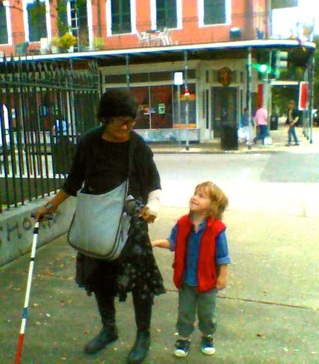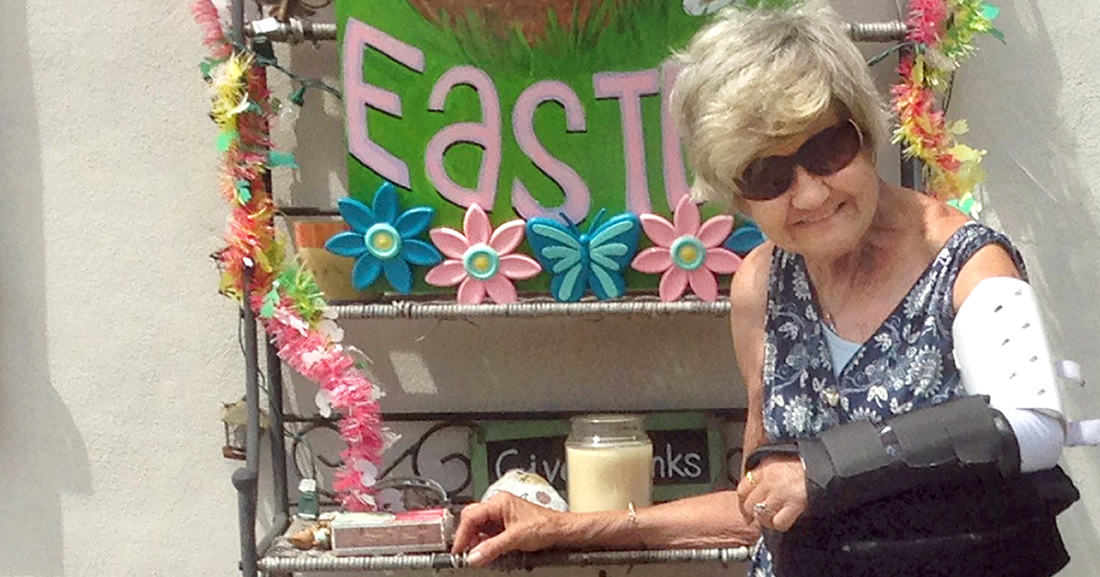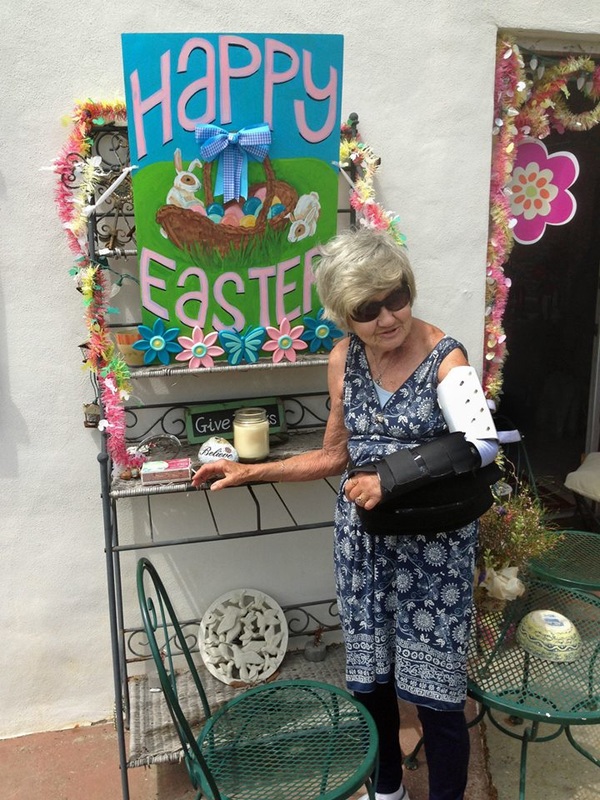Lane Shaw
The Bay's Poet Laureate, Keeper of the Mockingbird Garden and Decorator Extraordinaire, Lane Shaw brightens up the world.
- story by Pat Saik, photos by Cynthia Miller
“I had two children to raise. I could make a living as an accountant. I could not make a living as a poet. For fifteen years, I was also in the restaurant business in Portland, Oregon. I had three very successful restaurants. Each one even had singing waiters and waitresses.” Money or no, Lane Shaw never stopped writing poetry. She declares proudly and without hesitation: “I am a poet.” Lane has been writing poetry since she was in high school. Lane had the good fortune at that time to be encouraged and inspired by her creative writing teacher. “He told me: ‘Your writing is all poetry.’” Lane has had her poetry published in anthologies; her daughter Angelica collected and published many of her mother’s poems in a slender volume entitled “Lamentations of the Poet.” Asked about her opinion on the importance of poetry in the culture, she thinks for only a second and then answers with another question: “What is the importance of flowers in nature?” After moving to Bay St. Louis in 1999 — attactive as a city where one could walk — Lane began to hold salons in her home, the literary and artistic kind of gathering not unlike the salons in Paris where writer Gertrude Stein welcomed writers and artists and intellectuals of the day to the apartment she shared with Alice B. Toklas. “We didn’t just read poetry,” Lane explained. “We talked about all kinds of subjects — history and philosophy and politics. We had some great talks.” Lane also started a regular poetry-reading night at the Mockingbird Café. She is as encouraging to aspiring writers as her former creative writing teacher was to her. Now that Lane is virtually blind, she listens regularly to books on tape that Mississippi Services for the Blind make available. “I bet I order more books on tape than anyone else,” she laughingly boasts. “I loved to read before I couldn’t anymore. I’d read a book a day. History, best sellers, biographies, mysteries and so on. I read in a wide range of subjects. I lost one thousand books in Katrina.”  Lane with Ronin Chambers in the French Quarter Lane with Ronin Chambers in the French Quarter
Not only a poet and intellectual, Lane is a gardener. For years she has created and tended the gardens surrounding the Mockingbird Café.
“I do it because I love to make things pretty for Alicein [the café owner] — she’s like a daughter — but also for all the people who visit the café.” “Actually I ran a gardening service before Katrina where my crew of eight kids and I serviced several homes. We put in a number of gardens before Katrina. The kids needed work so I gave them a job.” Lane also loves to decorate her own place according to the season. She has a stack of container boxes crammed with decorations for everything from St. Patrick’s Day to Mardi Gras to Easter to Thanksgiving and to every holiday in between. “I like to do little things that brighten up the world.” Lane’s upbeat manner is undiminished by a difficult childhood. From the time she was seven years old until she graduated from high school, she lived in thirteen different foster homes. Her foster parents when she was in high school required that she perform many arduous domestic duties. “I resented the work I was made to do,” remembers Lane. “But in later years I have come to understand that work was natural. It’s just what you do. What I was angry about as a teen I came to appreciate as an adult. Besides that, I’m Irish. So I just kind of bound through life like a bouncing ball. I keep coming back.” “The Irish are tough,” Lane asserts with assurance. “Just look what the Irish have gone through. The Irish are happy no matter what they go through.” Lane’s grandparents on both sides emigrated from Ireland to the US in the late 1900s. Lane has been back to visit Ireland several times. Though her ancestors are from the north of the island, Lane is quite clear that “you haven’t seen Ireland if you haven’t seen the south. Down around County Cork, that’s where you find the real culture of Ireland.” Lane’s experience as a foster child led her in later life to take in kids who needed help and guidance. When she lived in Portland, Oregon, her birth place, as many as fourteen children, in addition to her own, lived with her over the years. Lane shines with pride. Several of the children she sheltered have graduated from college. Some became doctors and lawyers. Without exception, everyone she took in went on to have successful lives. A 100 percent success rate! She does not see her foster child experiences as negative. “I only think of myself as being a happy-go-lucky kid. I could make it okay even when I got bumped around. I was happy to carry my brother’s tuba on our walk to school, and I made friends with a stray dog I named Lucky.” Among Lane’s many life experiences is the harrowing one of her efforts to save herself and an 85-year-old from drowning during Hurricane Katrina as the roof of the house collapsed, severely injuring Lane’s arm and shoulder. To brace it during during the storm, she used a paint stick and wrapped it with duct tape. After Katrina, she spent several months in New York to have necessary surgeries as a result of her injuries. Her entire story about Hurricane Katrina is preserved as a part of the oral history project conducted by the Center for Oral History and Cultural Heritage, University of Southern Mississippi. The lengthy 2009 interview is housed in the University of Southern Mississippi Archives. After living for several months in New York, Lane was ready to return home. “I love Bay St. Louis. I just love the people, the setting, the weather. I don’t like the bugs, especially when I want to garden.” And why does she so love gardening? “There’s always a tomorrow in a garden.” THERE is a POEM
|
Categories
All
Archives
July 2024
|
Shoofly Magazine Partners
Our Shoofly Partners are local businesses and organizations who share our mission to enrich community life in Bay St. Louis, Waveland, Diamondhead and Pass Christian. These are limited in number to maximize visibility. Email us now to become a Shoofly Partner!






























 RSS Feed
RSS Feed























